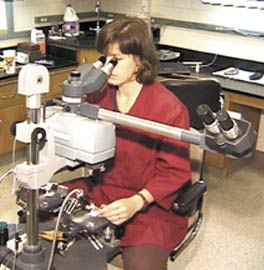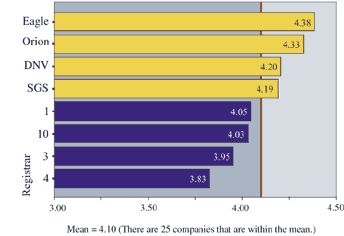|
|
|
|
Today's Specials |
 |
 |
News Digest |

Crime Labs Capture In a criminal courtroom setting, the jury must be able to put its full confidence in the validity of the physical evidence presented. That ability often hinges upon the jurors' image of the crime lab involved. By having the first forensics labs to be registered to ISO 9002, the Georgia Bureau of Investigation's Division of Forensic Sciences has sent a clear message to all that quality is a priority. In conducting their work, forensic scientists often follow guidelines set forth by the American Society of Crime Laboratory Directors. To help ensure that justice is carried out, the procedures involved in the handling and analysis of evidence must be indisputable. The Forensic Services Division sought ISO 9000 registration to help validate the quality of its work. Both Hollywood's fascination with crime stories and high-profile criminal cases have brought forensic science to the forefront. "Now people are a lot more knowledgeable about what goes on in a crime lab," notes Gary Theisen, the division's assistant deputy director. He explains that a more knowledgeable public means more knowledgeable juries who are more likely to question forensic work than they were in the past. Founded in 1952, the Division of Forensic Sciences' lab was the second statewide crime lab in the country. The laboratory's headquarters is divided into 11 sections, each specializing in particular areas, including administration, trace evidence, drug identification, serology and DNA, toxicology, pathology, and latent prints. Together, the headquarters lab and the six branch labs handle more than 500,000 pieces of evidence every year. Theisen affirms that the decision to pursue ISO 9002 registration was an attempt to further the labs' reputation for high-quality, accurate work and to build confidence among their customers, which include law enforcement agencies, prosecutors and the public. In addition to simply documenting the way they do business, the division's crime labs have used their ISO 9002 registration to commit to process improvement.
The North Carolina Department of Labor has become the nation's first state government agency registered to ISO 9001. In a ceremony held on July 15, the agency was presented with its certificate of registration by Robert W. Peach, an internationally recognized quality expert. Peach congratulated the department on setting an example for applying the standard to a government organization. North Carolina's Labor Department began investigating the possibility of ISO 9000 registration in 1997. The department chose ISO 9001 as a means to institutionalize the process management and continuous improvement efforts under the agency's total quality management initiative. "Our goal is to produce services that are consistent with our intentions," says North Carolina Commissioner Harry Payne Jr. "A commitment to quality is the clearest way to answer the public's call for performance and accountability." "The ISO 9001 registration is an independent and broadly recognized verification of our commitment to enhance public confidence," adds Curtis Ricketts, the agency's quality director. "It is a measure of progress in our desire to be a model of the well-organized, consistent and effective supplier of government service." Benefits realized during the ISO 9001 implementation include streamlined processes, increased clarity of management priorities, better communication of operational need and requirements, and improved consistency in delivery of services. Additionally, the "feedback triangle" (management reviews, action requests and internal assessments) provides an institutional approach to identification and cross-fertilization of improvement opportunities.
Management
Enhances Revenues
Research from the American Productivity & Quality Center (APQC) indicates that activity-based management (ABM) has developed into a powerful tool for helping organizations grow. These organizations are using ABM to improve effectiveness at both ends of the supply chain, enhancing revenues and providing customers with improved efficiencies. ABM has enabled some organizations to increase revenues 700 percent. In the past four years, APQC has conducted 45 site visits to organizations with successful ABM practices. Collectively, these best- practice examples provide ABM themes and enablers for success. The APQC's Seven Commandments for a Successful ABM Initiative are as follows: 1. Management must display commitment and give priority to all phases of ABM initiatives. 2. Application of ABM must add value to the organizational strategy. 3. The ABM methodology must be applied consistently throughout the process. 4. Cost-efficient and reliable reporting systems must be employed. 5. ABM information must be linked to improvement initiatives, operating and strategic goals, performance measures, and the operating environment. 6. Linkage to incentives is required to demonstrate the importance of achieving set goals. 7. Training and education must be used throughout the organization. "These commandments are interrelated and cannot exist independent of one another," states Laura DeVries, APQC benchmarking specialist. "These consistent best practices provide guidelines for any organization pursuing or wanting to begin an ABM initiative." Several site visits conducted as part of this research stemmed from a recent Arthur Anderson/APQC benchmark study, Activity-Based Management III: Best Practices for Strategic Improvement. The focus was expanded over that of the previous two studies; it now includes use of activity-based management budgeting, use of ABM information to enhance revenues and the benefits of the ABM initiative. The final report based on this study is available to members for $195 through APQC's International Benchmarking Clearinghouse. Nonmembers can purchase the report for $395. A free executive summary is available at APQC's Web site at www.apqc.org .
In April 1996, a core group of telecommunications service providers, including Bell Atlantic, BellSouth, Pacific Bell and Southwestern Bell, decided to establish better quality systems requirements for their industry. The resulting QuEST Forum believes that the evolution of business needs and the quality initiatives within the telecommunications industry call for an adoption of a common set of quality requirements. To that end, the QuEST Forum developed the TL 9000 quality management standard to foster continued improvements to the quality and reliability of telecommunications service. The QuEST Forum is currently involved in a pilot program to test all aspects of the TL 9000 standard, including the understandability and accuracy of the TL 9000 handbook, accreditation and registration processes, training courses, and supporting material. Among the program's priorities is examining the proposed accreditation process for potential registrars. Several registrars have volunteered to become part of this pilot program. "Volunteers are closer to what's happening, so there may be a slight market advantage for them," explains Reg Blake of BSI, a participating registrar. "But QuEST has made some provisions to minimize that advantage, and beginning September 15, registrars not in the program can apply for accreditation." Conformance to TL 9000 will be determined by accredited registrars through third-party audits, as with the ISO 9000 process. The QuEST Forum establishes the requirements that qualify registrars and will also provide registration training. The actual accreditation process will be the responsibility of accreditation bodies recognized by the QuEST Forum. Registrars will be responsible for verifying that their clients have implemented a quality management system that complies with TL 9000. In carrying out this responsibility, registrars must comply with their own procedures, the requirements of their accrediting body and the QuEST "Code of Practice for Quality System Registrars." For more information on the QuEST Forum, visit www.questforum.org .
In our July 1999 article "How Do Registrars Measure Up?" We calculated the
Professionalism category incorrectly. After correcting the error, the mean increased from 3.70 to 4.10 and Eagle Registrations of Dayton, Ohio, joined
the list of companies above the mean (see figure). In addition, the correlation of this category to overall customer satisfaction increased from 0.632 to 0.659.
NIST-Accredited Labs The National Voluntary Laboratory Accreditation Program site now lists more
than 700 testing and calibration labs accredited by NIST and offering more than 850 different services. Also available are directory indexes by accreditation field, name, location and NVLAP identifier code. Chemical Industry Y2K Guide Contract Electronics and EMI Information Lab Referral Network ASTM Technical Standards |
Menu Level Above
This Menu LeveL
Menu Level Below
Copyright 1999 QCI International. All rights reserved.
Quality Digest can be reached by phone at (530) 893-4095. E-mail: Click Here





